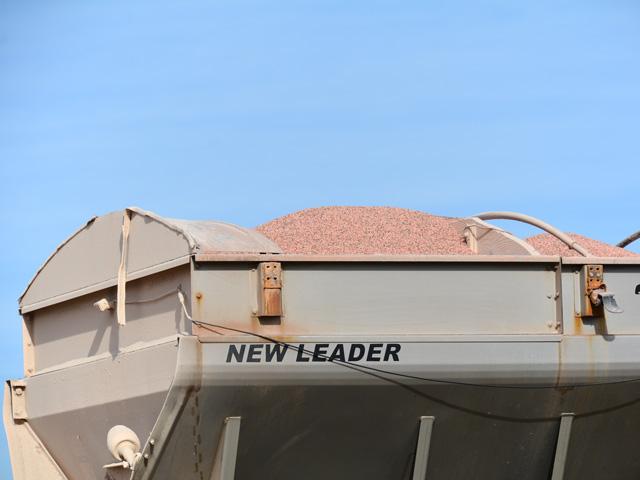Fertilizer Tariffs Questioned
Members of Congress Call for Rollback of Tariffs on Moroccan Phosphate Products
OMAHA (DTN) -- With fertilizer prices and supplies raising global worries, more than 80 members of Congress have joined in a bipartisan, bicameral letter to the International Trade Commission to eliminate duties on phosphate from Morocco and suspend any process that could impose new import duties on urea ammonium from Trinidad and Tobago.
"One of the biggest concerns I've been hearing lately from farmers is the sharp increase in fertilizer costs," said Rep. Cindy Axne, D-Iowa. "Iowa growers are particularly affected and are facing increased stress and uncertainty. In fact, I've even heard from producers considering planting less this spring. With record-high prices and uncertain future, I'm hopeful the International Trade Commission will listen to the concerns expressed by the bipartisan group of members and reconsider and suspend trade duties that have contributed to the price increases."
Axne, along with Rep. Tracey Mann and Sen. Jerry Moran -- both Kansas Republicans -- led the letter with 83 other members of Congress.
"Skyrocketing input costs, and particularly record-high fertilizer prices, are damaging Kansas farmers' ability to grow a crop and earn a living," Moran said. "With tight fertilizer supplies in the U.S., I am urging the administration to remove or suspend countervailing duties on fertilizer products from key suppliers. This commonsense solution would increase the availability of fertilizer products and provide needed relief for Kansas producers."
WANT TARIFFS ROLLED BACK
In an interview, Axne noted the concerns raised by lawmakers, given that members of both parties and chambers backed the letter calling on the tariffs to be rolled back.
A year ago, the International Trade Commission (ITC) voted 4-1 to place 20% import duties on phosphate fertilizer from Moroccan producer OCP Group, as well as duties on phosphorus imports from Russia. The tariffs came after a petition in 2020 from Mosaic Co., which maintained Morocco and Russia used unfair subsidies to sell phosphorus on the global market. The U.S. in 2019 had imported about 2 million metric tons (mmt) of phosphorus fertilizer from Morocco.
P[L1] D[0x0] M[300x250] OOP[F] ADUNIT[] T[]
Since the ITC imposed the phosphate tariffs, retail prices of MAP have risen $265 a ton to $955 a ton, according to DTN's weekly fertilizer price data. DAP prices have increased $304 a ton to an average of $919 a ton. MAP and DAP prices are more than double what they were in March 2020.
OCP and agricultural groups have appealed to the ITC to remove the tariffs against Morocco, but the ITC appeals process is as slow as pond water. A ruling on the appeal as of now is not expected until midsummer, at which time Mosaic could also then file its own appeal of any ITC decision to roll back the 20% tariffs.
U.S. PHOSPHATE IMPORTS INCREASING
Mosaic Co. maintains the countervailing duties against Morocco and Russia are not tied to the recent increase in fertilizer prices, citing that U.S. phosphate imports increased by 1.7 mmt in 2021, or 73% compared to 2020. In February, Mosaic also reported its phosphate earnings in 2021 were $1.2 billion, compared to an operating loss of $147 million for 2020.
In their letter, members of Congress asked the ITC to reconsider the tariffs as well as halt a separate push to slap countervailing duties on urea ammonium nitrate fertilizer from Trinidad and Tobago. The lawmakers noted "conditions surrounding on-farm expenses in the United States have dramatically changed since" the ITC decision a year ago. Lawmakers noted USDA projects farm production expenses to increase at least 6.6% overall this year. Several factors come into play including China's moves to curtail fertilizer exports, as well as supply chain challenges, higher demand, and other inflationary pressures, lawmakers wrote.
VOLATILITY AND PRICE INCREASES
"Additionally, farmers are seeing fertilizer prices four to five times higher than this time last year. Given the last several years' unprecedented volatility for farmers and ranchers, it is crucial America avoids imposing unnecessary duties that could further limit the fertilizer supply or raise its cost," the congressmen and senators wrote to the ITC.
As of now, the U.S. relies on imports for about one-third of all domestic phosphate fertilizer, and Morocco has been a long-time supplier, the lawmakers added. "Currently, only about 35% of the world's traded supply of phosphate fertilizer is not subject to duties for import into the U.S. This has unnecessarily restricted supply and added costs. Historically, phosphate fertilizer accounts for 15% of total cash costs for producers. Since the U.S. Department of Commerce's decision to impose duties on phosphate fertilizer imports from Morocco, phosphate fertilizer prices have increased 93%," the letter to the ITC added.
Along with that, since the Department of Commerce began its investigation of duties on UAN imports from Trinidad and Tobago, import volumes of UAN have fallen 97%. "Because there is a degree of substitution among nitrogen fertilizer, the impact of the tariffs on UAN is felt across all nitrogen products," lawmakers wrote.
As DTN noted this week, UAN28 prices are $603 a ton, an all-time high, and UAN32 is $704 a ton, also an all-time high.
Along with the letter from lawmakers were comments of support from the American Soybean Association and the National Corn Growers Association as well. ASA and NCGA both opposed the duties placed on Moroccan phosphate and have been trying to halt the ITC from making a similar decision on UAN from Trinidad and Tobago.
"Fertilizers and other inputs have been at an all-time high, and the war in Ukraine promises to drive up the price of products even more," said Iowa farmer and NCGA President Chris Edgington. "Fertilizers have become increasingly hard to secure and pay for because of tariffs or the threat of tariffs on imports."
DTN Fertilizer Trends for March 16 can be seen at https://www.dtnpf.com/…
Chris Clayton can be reached at Chris.Clayton@dtn.com
Follow him on Twitter @ChrisClaytonDTN
(c) Copyright 2022 DTN, LLC. All rights reserved.






